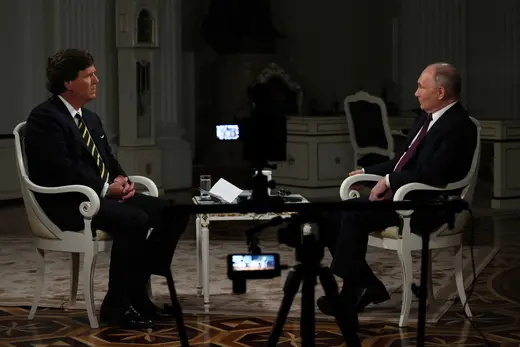In Brief
What Tucker Carlson’s Putin Interview Means for the War in Ukraine
In last week’s rare interview with a Western media figure, Russian President Vladimir Putin tried to combine a more reasonable tone with endless reminders of why Western governments think he’s not really interested in negotiating an end to the war with Ukraine.
Coverage of Russian President Vladimir Putin’s recent interview with pundit Tucker Carlson focused on how long and how long-winded it was. What was Putin trying to do here?
No matter how tedious the interview seemed, Putin clearly had some real goals in mind, and it’s worth parsing them a little. I was struck by two contradictory objectives. The first was to get Western governments and publics thinking and talking about a negotiated settlement of the war in Ukraine. After two years of proclaiming that Russia had to experience a “strategic defeat,” he claimed that Western powers now see “it is never going to happen.” Instead they will have to figure out how to back down “with dignity.” Russia, he insisted, is “ready for this dialogue.”
That was his first goal. What was the second?
Putin seemed even more determined to justify both his decision to start the war and his entire approach to relations with Ukraine. Unfortunately for him, this second goal undermined the first one, maybe fatally. It is hard to imagine any other world leader trying to legitimize invading another country by starting with events of the ninth century—and then slow-walking their way through several centuries after that. Carlson spoke for many listeners when he interrupted Putin to say, “I am losing track of where in history we are.” (Putin’s helpful reply: “In the 13th century.”)
More on:
But it wasn’t getting bogged down in historical minutiae that most hurt Putin’s case. He undermined his claim to be ready for practical diplomacy by endlessly parading his ethno-nationalist obsessions. And not all of these were matters of distant history. Blaming Poland rather than Adolf Hitler and Joseph Stalin for starting World War II was only the most egregious example. By the time—very, very late in the broadcast—Putin got around to proposing negotiations, he had already made himself sound like somebody not worth negotiating with.
When the war began, Putin said his goals were to “demilitarize” and “denazify” Ukraine, and he seemed to mean eliminating Ukraine as an independent state. Did the interview suggest he sees those two goals at all differently now?
Not really. Because Putin’s rhetoric has long sounded so extreme and over the top, Western policymakers will be on the lookout for signs that he’s rethinking his objectives. But on “demilitarization,” it’s clear from the way he talked to Carlson about the North Atlantic Treaty Organization (NATO) that he still aims for some sort of guarantee that Ukraine will never join the alliance. He probably also assumes that, with the future of U.S. military aid to Ukraine up in the air, he can get Western governments to forswear—or least severely limit—their future security relations with Ukraine. Nothing new here, in other words.
“Denazification” was a slightly different, and maybe more interesting, story. Here Putin explicitly told Carlson that “we haven’t achieved our aims yet.” What Russia wants, he said, is “the prohibition of all kinds of neo-Nazi movements.” To this, Putin then added something he almost never admits (because it conflicts with his entire view of history since the ninth century!): that Ukrainians “have the right” to define themselves as a separate people, just “not on the basis of Nazism, of Nazi ideology.”
Because his comments were such a jumble, one could certainly conclude that Putin remains committed to abolishing Ukrainian identity. But it’s also conceivable that he’s beginning to position himself to settle for much less (to back down “with dignity,” as he said of the compromises he wants Western governments to make). What he told Carlson about “denazification” was no more than the faintest hint of retreat, but it’s one issue worth watching.
Carlson knew he had to raise the case of Evan Gershkovich, the Wall Street Journal reporter now imprisoned in Russia. What did Putin say on this matter?
As with the interview as a whole, Carlson got a two-part answer, one in which Putin combined a calm professionalism with an insulting provocation. He insisted that Russia is “ready to talk” about Gershkovich’s case, though he noted that such discussions are best handled quietly by the security services of both sides. Even so, he could not resist talking about what he wants in return—the release of Vadim Krasikov, a Russia “patriot” serving a long prison term in Germany for murdering someone Putin described as a Chechen “bandit.” Equating Krasikov, a KGB hitman, with a widely respected young American journalist was too much even for Carlson, who objected that the cases were “completely different.” They are, Putin admitted, but he said that he wants U.S. help in getting his own hired-gun out of jail.
More on:
This final exchange encapsulated Putin’s approach to the entire interview. On issue after issue, he undercut a practical message with an overt reminder of why and how he and Western governments are at odds in the first place.
 Online Store
Online Store

